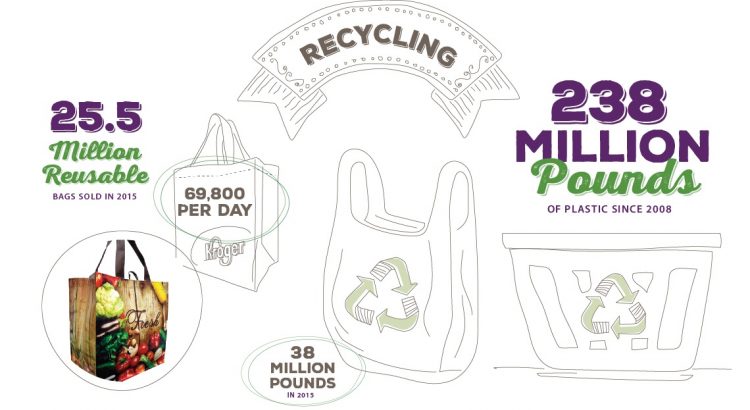Kroger zero waste initiative, Kroger owns Harris Teeter groceries, 25.5 million reusable bags sold in 2015, 106 million reusable plastic containers reused, Donating safe perishable foods to food banks
I am attending the Harris Teeter retirement and awards banquet near Charlotte, NC tomorrow.
Since Harris Teeter is owned by Kroger, I decided to read about their zero waste initiative.
From Kroger.
“Moving our facilities toward “zero waste” is one of Kroger’s key sustainability priorities. In 2015, we continued to move the needle in our waste reduction initiatives and continued to look for new ways to improve our business practices. Whether it is diverting waste from landfills, reducing our packaging, recycling plastic bags, or donating safe, perishable foods to food banks, we are increasing recycling rates and finding cost-effective and responsible alternatives for our waste.
Several years ago, Kroger joined the EPA’s Waste Wise Program and adopted the EPA’s “zero waste” definition for our company-wide sustainability efforts. This nationally recognized program provides a tool to benchmark, measure and communicate our efforts in a more consistent and cohesive way. It also allows us to track individual waste streams, track our progress over time and identify additional opportunities for waste reduction. Our goal is to meet and exceed the EPA’s zero waste threshold of 90%, in all our facilities.”
“In 2015, we expanded the enterprise-wide waste diversion initiative in all grocery stores. With a focus on food waste diversion, Kroger increased the amount of perishable foods donated as well as expanded recycling initiatives. Kroger was able to increase the number of participating food waste recycling locations to 1,190. A combination of composting, anaerobic digestion and animal feed programs are utilized.”
“In 2015, we shipped 106 million RPCs of fresh produce to our stores. RPCs improve product quality and significantly reduce waste. We continue to increase our volume of fresh produce shipped in reusable plastic containers (RPCs). Examples of items currently shipped this way include: green onions, radishes, lettuce, grapes, tomatoes, avocados, corn, beans, carrots, cabbage, cauliflower, oranges, grapefruit, lemons, eggs and celery. We estimate that the total use of RPCs last year eliminated the use of more than 73,500 tons of waxed and corrugated boxes.”
“ENCOURAGING CUSTOMERS TO RECYCLE
We continue to drive our in-store plastic bag recycling program with associates and customers. In 2015, this program recycled 38 million pounds of plastic from our stores and distribution centers. We also redesigned the bins and will be expanding what we accept so that we can further increase the amount of plastic that is recycled. We are also placing recycling arrows on corporate branded bread bags so customers know they can recycle them in-store as well.
WHAT CAN YOU DO TO HELP?
Most residential curbside recycling programs will not accept plastic wrap material. However, Kroger partners with vendors who want this material to recycle into products such as new recycled plastic bags, landscape materials and plastic composite lumber. Customers can recycle this material via the plastic bag recycling barrels located in stores.”
“REDUCING PLASTIC BAG USE AND INCREASING USE OF REUSABLE BAGS
The Kroger family of stores continues to help customers reduce plastic bag use and transition to reusable bags. In fact, we have saved over 1 billion plastic bags from being used since 2008 through better bagging practices by our associates and by our customers using more reusable bags.
Our stores encourage customers to change their habits by offering a wide variety of reusable bags. Last year, we sold an incredible 25.5 million reusable bags—an average of 69,800 reusable shopping bags per day.
Additionally, many parking lots at our Kroger family of stores have signage on the cart corrals that reminds our customers to bring their reusable bags into our stores. Simple reminders, such as these cart corral signs, can further reduce plastic bag waste and encourage customers to change their shopping habits.”
Read more:
http://sustainability.kroger.com/environment-zero-waste.html




